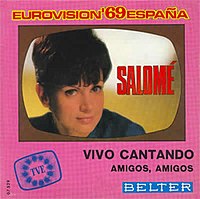music.wikisort.org - Composition
"Vivo cantando" (Spanish pronunciation: [ˈbiβo kanˈtando]; "I Live Singing") is a song recorded by Spanish singer Salomé. The song was written by María José de Cerato and Aniano Alcalde, and it was produced by Augusto Algueró. It is best known as the Spanish winning entry at the Eurovision Song Contest 1969.
This article includes a list of general references, but it lacks sufficient corresponding inline citations. (June 2014) |
| "Vivo cantando" | |
|---|---|
 | |
| Single by Salomé | |
| B-side | "Amigos, amigos" |
| Released | 1969 |
| Length | 2:09 |
| Label | Belter |
| Songwriter(s) |
|
| Producer(s) | Augusto Algueró |
| Eurovision Song Contest 1969 entry | |
| Country | Spain |
| Artist(s) | María Rosa Marco |
| As | |
| Language | |
| Composer(s) | María José de Cerato |
| Lyricist(s) | Aniano Alcalde |
| Conductor | Augusto Algueró |
| Finals performance | |
| Final result | 1st |
| Final points | 18 |
| Entry chronology | |
| ◄ "La, la, la" (1968) | |
| "Gwendolyne" (1970) ► | |
The song was joint winner with the United Kingdom's "Boom Bang-a-Bang" performed by Lulu, "De troubadour" by Lenny Kuhr representing the Netherlands, and "Un jour, un enfant" sung for France by Frida Boccara. It was Spain's second winning entry in the contest and the last to date.[1]
Background
The song is a very up-tempo number, sung from the perspective of a woman telling her lover about the positive changes he has had on her, specifically that she now lives her life singing.
Salomé recorded the song in six languages: Spanish (Castilian), Catalan (as "Canto i vull viure"), Basque ("Kantari bizi naiz"), English ("The Feeling of Love"), French ("Alors je chante") and Italian ("Vivo cantando"). Israeli singer Rika Zaraï released a cover of the French version, which spent three weeks at number one in the French singles chart from 16 August to 5 September 1969. In Spain the song reached 1 on the Spanish Singles Chart.[2]
Eurovision
Two memorable aspects of the performance at Eurovision were Salomé's costume – a Pertegaz pantsuit covered in long strands of porcelain resembling beads – and the fact that the singer chose to dance on the spot during certain parts of the song. Dancing was against the Song Contest rules at the time; Salomé was not penalized, however, as the performers from Ireland and the United Kingdom had done the same that year as well.
It was succeeded as Spanish entry at the 1970 contest by Julio Iglesias with "Gwendolyne" and at the 1971 contest by Karina with "En un mundo nuevo".[3]
References
- "Vivo cantando - lyrics - Diggiloo Thrush". www.diggiloo.net. Retrieved 2022-06-08.
- "Billboard". 3 May 1969.
- Sánchez Olmos, Cande; Segarra Saavedra, Jesús; Hidalgo Marí, Tatiana (2021-02-05). "'Brand Placement' en los videoclips del Billboard Hot 100: ¿integración o imposición de marcas?". Tripodos (44): 63–81. doi:10.51698/tripodos.2019.44p63-81. ISSN 2340-5007. S2CID 202455793.
External links
- Official Eurovision Song Contest site, history by year, 1969.
- Detailed info and lyrics, The Diggiloo Thrush, "Vivo cantando".
На других языках
- [en] Vivo cantando
[es] Vivo cantando (canción)
«Vivo cantando» es una de las cuatro canciones que ganaron el Festival de la Canción de Eurovisión 1969 celebrado en el Teatro Real de Madrid en marzo de 1969. Interpretada en español por Salomé para España. Fue la segunda ocasión, y hasta ahora última, en la que España ganó el certamen.Другой контент может иметь иную лицензию. Перед использованием материалов сайта WikiSort.org внимательно изучите правила лицензирования конкретных элементов наполнения сайта.
WikiSort.org - проект по пересортировке и дополнению контента Википедии